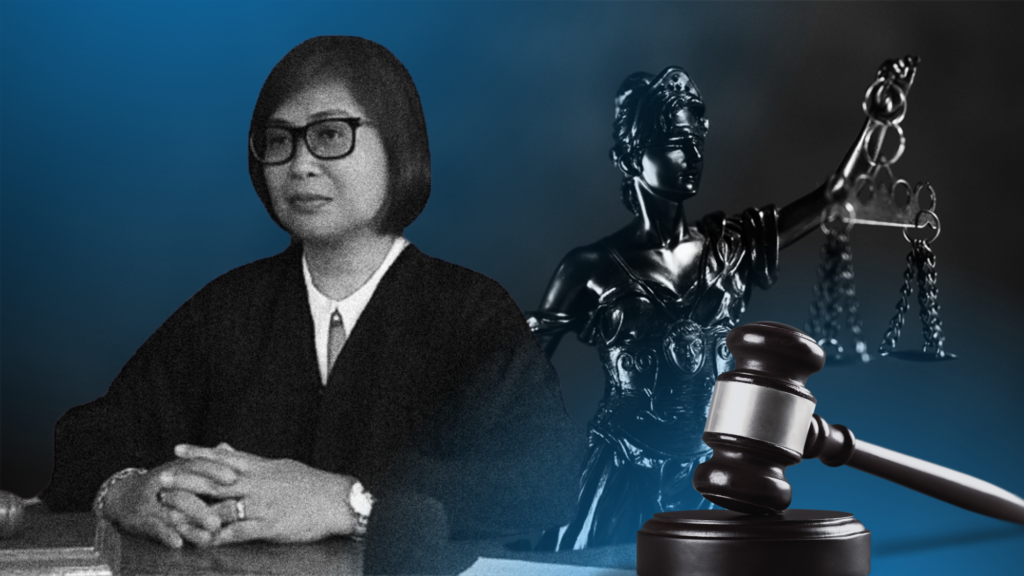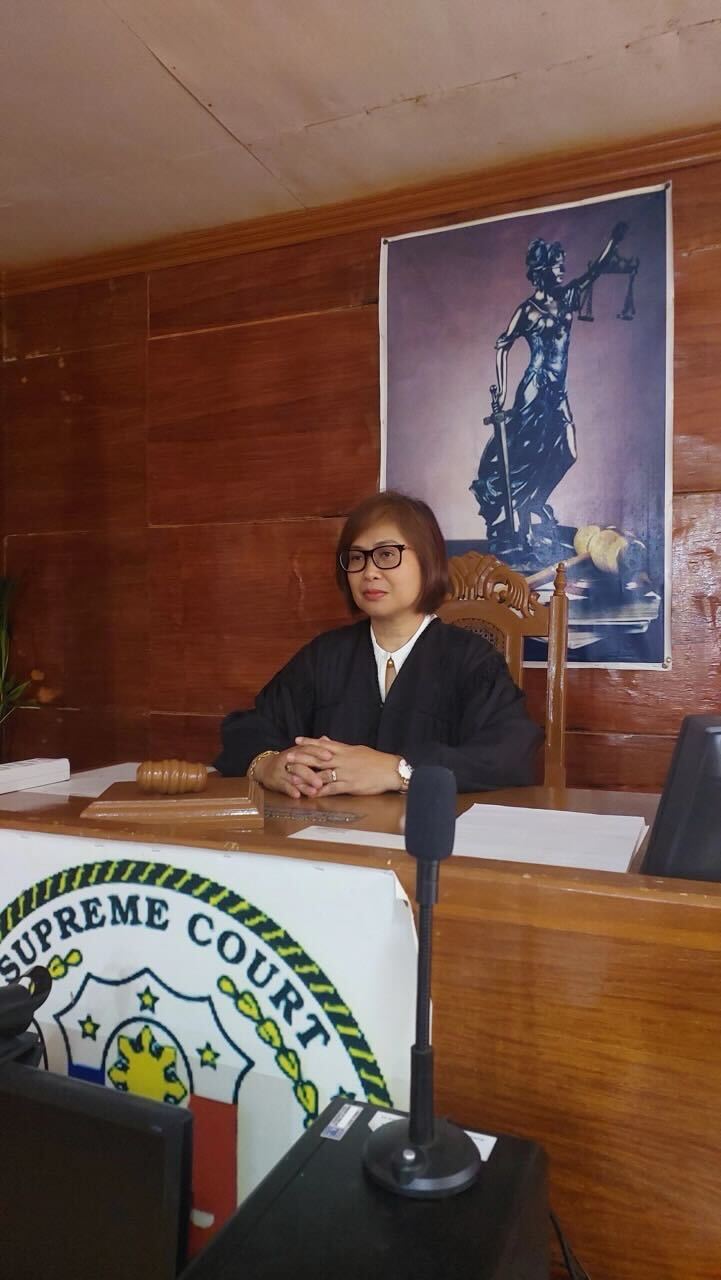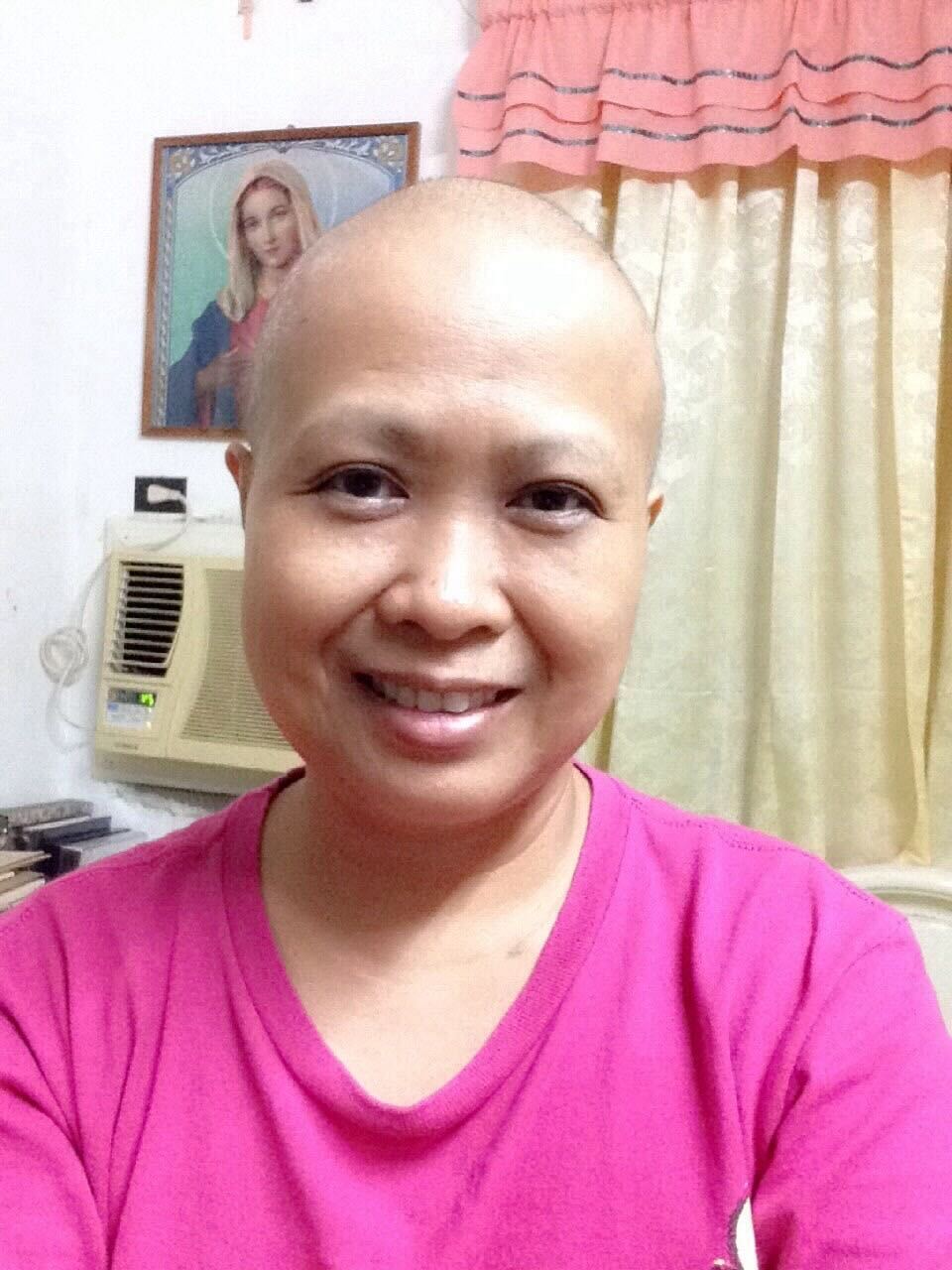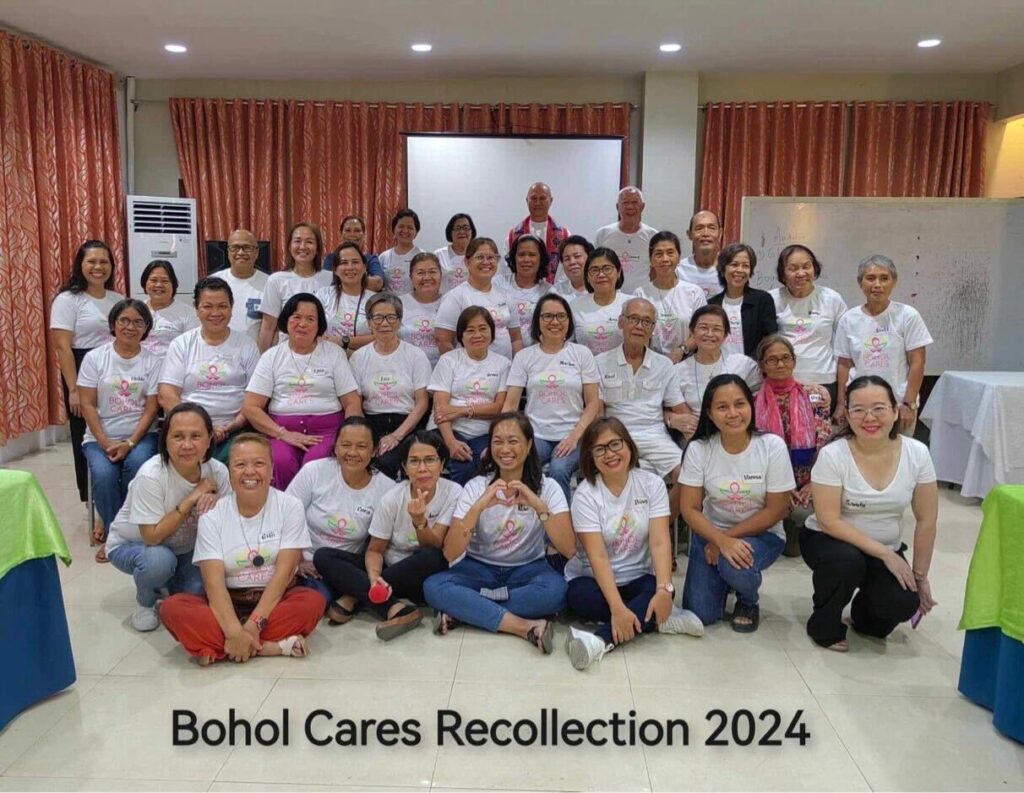Judge Olivia Mende: A Boholana judge’s journey through life with cancer

Judge Olivia Migriño Mende, the boholona judge who fought battles of both cancer and justice.
BOHOL, Philippines – The hallowed halls of justice have been her battleground for 17 years.
Cloaked in her judicial robes and wearing her usual poker-faced resolve, she always defends integrity and justice in the courtroom. She is firm and fair-minded, a woman of strength who upholds the law without being unduly lenient.
Judge Olivia Migriño Mende has always been a fighter, whether inside the courtroom or out. Renowned as one of the trial court judges in the region with high case disposition ratings, she was undeniably excellent. And that’s for sure.
However, in 2014, an unfamiliar case came across her desk, which led her into one of the most challenging battles of her life. Yet, this battle was not to be fought in the familiar confines of the courtroom bench, certainly not in the usual manner.
On a bright day in March 2014, Judge ‘Bing’, as her friends and family called her, decided to visit the hospital for a routine mammogram. She was dressed in attire more casual than her usual courtroom garb.
At 45 years old, she understood the importance of regular check-ups for women her age, as the risk of illnesses, including cancer, increases with age. And so, she went.
READ MORE:
Cancer survivor, her wish for 2024: ‘To live healthier, more healing’
Cancer burden: Draining people’s lives, pockets
Breast cancer patients turn ‘warriors’ and ‘victors’
Like many other patients, she held onto hope that everything would turn out alright. However, during the breast ultrasound, a small lump was detected in her left breast.
She was initially advised to monitor it every six months. Yet, by the fourth monitoring, the doctor recommended a biopsy, and it was then that she received the devastating news—she had breast cancer, stage 2B.
“I was 45 years old ato, akong mga anak, they were still studying. But I was praying always. On the fourth time, when I saw the face sa doctor, I saw concern. Kita gyud ko ba, something is wrong. Pagingon niya magbiopsy, I was almost certain nga cancer gyud to,” she said.
(I was 45 years old, my children, they were still studying. But I was praying always. On the fourth time, when I saw the face of the doctor, I saw concern. I saw, something is wrong. When he said that I should undergo a biopsy, I was almost certain that it was cancer.)
Childhood
Born on February 8, 1969, Judge Bing is the fourth child in a family of five, and she is the youngest daughter of parents who are both lawyers.
She attended Tagbilaran City Central Elementary for her primary education and secondary in Bohol National High School, now known as Dr. Cecilio Putong National High School, where she graduated in 1985. Later, she pursued AB Philosophy at UP Diliman for her college studies.
Despite her desire to continue studying law at Diliman, her father had other plans. Nursing was in demand for overseas opportunities at that time, and he wished for her to pursue it.
Reluctantly, she considered his wishes but ultimately decided against it.
Instead, she took a job as an ordinary clerk at the Japan International Cooperation Agency (JICA) and self-supported her law studies. She graduated, passed the bar, became a lawyer, and eventually ascended to the position of a judge.
Being an MTC judge
Judge Bing used to rise at 5 a.m. every day, a habit she stuck to religiously, even after sleeping late at night. At that early hour, she would tidy up her space and make sure her beloved cats were fed.
As a municipal trial court judge in Bohol, Judge Bing had a unique workload. She oversaw not just one, but three MTC branches—15, 16, and 17—handling over six municipalities. Every day, she drove 70 to 80 kilometers to reach her stations.
Despite her demanding schedule, Judge Bing never missed a deadline. She was known for her punctuality and took pride in keeping up with her commitments.
Inside her courtroom, Judge Bing promoted a welcoming environment where settling disputes amicably was encouraged. She believed that true justice often lay in finding common ground rather than prolonging conflicts.
“In the courtroom… particular ko og promptness, dili ko ganahan og late. I am also in favor of the amicable settlement, kusog kaayo ko mo encourage og amicable settlements among parties. Mao gani siguro pod reason ngano paspas kaayo nako mahuman ang mga kaso,” she said.
(In the courtroom…I am so particular with promptness, I don’t like being late. I am also in favor of the amicable settlement, I am always encouraging amicable settlements among parties. This is perhaps the reason of the swift resolution of the cases I handle.)

Judge Olivia Mende handles three MTC branches in Bohol.
Judge Bing handled cases primarily at the municipal court level, where the focus was not on heinous crimes or injuries, but rather on civil cases related to land. This was because almost all civil cases related to land fell under the jurisdiction of municipal courts.
As first-level courts, Municipal Trial Courts like Judge Bing handled the majority of civil cases, including those involving land disputes. The assessed value of the land served as the basis for jurisdiction in these cases, and it was generally not very high.
In terms of criminal matters, she also dealt with cases involving suspected NPAs (New People’s Army). One notable instance involved the late and highest commander, Kom Puk, who was also the accused in the case.
“What makes it challenging is the effect after, ang napilde nasuko nako and nabash ko sa social media. They call me names. They accordingly file an administrative case against me but I’m not afraid since I’m sure sa ako decision but hasol bitaw. Low profile ra gyud ko,” she said.
(What makes it challenging is the effect after, those who lost will get angry at me and I will be bashed in social media. They call me names. They according file an administrative case against me, but I’m not afraid since I’m sure of my decision but it is just a hassle. I am just a low profile person.)
A devoted mom
Judge Bing leads a multifaceted life. She juggles her responsibilities as a Municipal Trial Court judge with her roles as a devoted mom and a dedicated professor.
As a mother, Judge Bing has experienced the ups and downs of family life. Following a separation from her husband in 2017, she found a newfound sense of peace in her household.
This change taught her valuable lessons about adaptation and stress management, ultimately strengthening her bond with her children. Though managing the household single-handedly has been challenging, she navigates through it, albeit feeling the strain of exhaustion at times.
Judge Bing has three daughters. Before her separation from her husband, she admitted to being strict, largely due to the stress she was under.

Judge Olivia Mende and her three daughters.
However, with time and maturity, she recognized the barriers that strictness erected between her and her daughters. Now, she strives to foster a more open and trusting relationship with them.
“I would say dili ko strict, but before katong wala pa mi gabuwag sa ako bana, strict ko kay stress man gud ko. But karon, ni mature na siguro pod ko. Nakarealize ko I haven’t really been close to them kay mahadlok sila nako. But karon, I would like to believe nga we are really open. Sometimes, ako pay am-aman nila,” she shared.
(I woould say that I am not strict, but before when my husband and I were together, I was strict because of the stress I was facing. But now, I have, perhaps, matured. I have realized that I haven’t been close to them because they are scared of me. But now, I would like to believe that we are really open. Sometimes, I am the ones who is being appeased.)
A dedicated law professor
As a teacher, Judge Bing adopts a distinct approach characterized by engagement and respect. Despite her naturally introverted personality, she creates an inclusive learning environment where students feel empowered to express themselves freely.
“Dili ko strict pero og mahadlok man gani sila, it’s not because I’m strict but I do recitations… I’m not the type of teacher nga makighugoy hugoy sa mga students because I am wary nga kining mga students, they will appear before me puhon, and I don’t want nga naa silay ano nako. Student-teacher relationship ra gyud na,” she said.
(I am not strict but if they are even scared of me, it’s not because I’m strict but I do recitations…I’m not the type of teacher who are buddy-buddies with my students because I am wary that these students, they will appear before me in the future, and I don’t want that they have some relationship with me. What I have with them is just a student-teacher relationship.)
Judge Bing values respect in her classroom. If a student stands up and doesn’t answer, she patiently waits for their response instead of feeling insulted. She believes in giving her students the opportunity to express themselves comfortably, without pressure or embarrassment.
“Dili ko mang-insulto, if magbarog ka diha kay dili ka katubag, maghuwat ra gyud ko og muingon ka nga ‘mulingkod na ko, ma’am,” she said.
(I would not insult the student, if you stand there because you cannot answer, I will just wait until the student says ‘I will now sit down, maam’.)
Currently, Judge Bing is focusing on Civil Law Review sessions.
In the past, she handled a broader range of subjects, including Criminal Law, Criminal Procedure, Business Administration, Remedial Law Review, and Practice Court.
Hobbies
Aside from being a career-driven woman, Judge Bing has always been an avid seeker of solace and adventure. She found refuge both beneath the waves through free diving and on the scenic trails while biking around Bohol.
“Happy gyud kaayo ko under the water,” she said.
(I am so happy under the water.)

Judge Olivia Mende enjoys free diving as a hobby.
Breast cancer stage 2B
Her life took a drastic turn upon her cancer diagnosis. Despite the daunting battle ahead, Judge Bing approached her treatment with utmost strength.
She underwent surgery in April 2014 followed by a rigorous course of chemotherapy from July to December of the same year.
Throughout her treatment journey, Judge Bing remained committed to her career. She refuses to let her illness overshadow her professional aspirations.
READ MORE:
Breast cancer: ‘No longer a death sentence’
More needs to be done: Better breast cancer treatment, care pushed
Even during hospital visits, she always brought her laptop with her because she believed that immersing herself in her work helped her cope with the emotional toll of her illness and ward off feelings of depression.
“Katong part nga motrabaho gyud ko, moinsist gyud ko motrabaho part of my denial to siya. Akong feeling ba, dili ko mosugot nga mapilde ko ani nga cancer, if opaw, maopaw gud. Coping pod nako, but I realize it’s part of denial stage, I can do this,” she said.
(The part where I would work, I would insist that I work was part of my denial stage. My feeling, I will not allow that I will lose to cancer, If I go bald, then I go bald. That is also my way of coping, but I realize it’s part of the denial state, I can do this.)

Judge Olivia Mende was diagnosed with stage 2B breast cancer in 2014.
Despite the financial strain and the strain on her marriage during that time, Judge Bing found support from her family, especially her husband, who stood by her side through every chemotherapy session and shouldered the burden of expenses.
Her children served as a constant source of motivation. Despite the uncertainty of her health, Judge Bing refused to succumb to negativity. She embraced each day as a precious gift and vowed to live her life to the fullest.
“My children are my motivation, but what motivated me is my life. I realize nga my life is precious diay (really precious). I cannot waste my life wishing to die. I want my life, I want to live my life. When you are broken and hurt, sometimes, you wish to die. But when finally God gave you that, makaingon ka nga (you can say that) ‘Joke Lord, I have to live. Life is my main motivation’,” she said.
While she remains cautious about declaring herself cancer-free due to the unpredictable nature of the disease, she remains diligent in her treatment regimen. Regular medication and check-ups every six months are part of her ongoing battle against cancer.
“I would like to believe nga cancer free, but ang cancer man gud, you can never say you are cancer free. Because the cells are there. I cannot say that I’m cancer-free, but I’m on medication. But I’m living my life, that’s for sure. Every six months naa koy drug nga i-take og dextrose. Naa sad koy pill sad ginatake every day (Every six month, I have a drug that i-take through dextrose. I also have to take a pill every day.),” she said.
Bohol Cares
One of the factors that truly made a difference for Judge Bing during her cancer journey was the support and comfort she found in a group called Bohol Cares, composed of fellow cancer patients.
Being part of Bohol Cares was not just about sharing experiences—it was a lifeline for Judge Bing’s mental health. Not everyone understands what cancer patients go through, which is why having a supportive community to share with was so vital.
“Sa mental health, you know, dili man gud tanan makasabot what a cancer patient undergoes, mao na og naay grupo, naay avenue nga makashare,” she said.
(In mental health, you know, not all can understand what a cancer patient undergoes, that is why if there is a group, there is an avenue to share.)

Bohol Cares now has more than 20 members, cancer patients whom they also assist, with Judge Olivia Mende as the president of the group.
The group held quarterly meetings where members could connect and support one another. They would assign someone to share their testimonial during these gatherings, providing inspiration and encouragement to all.
When the need arose, they would come together for recollections, where they could reflect and find strength.
Bohol Cares also organized patient visitations, both in-person and online during the pandemic. They even held healing masses and retreats, as well as festive events like Christmas parties.
When a member was undergoing treatment or chemotherapy, the group would offer practical assistance through their “Gift of Love” program.
This gesture, along with occasional support from benefactors, provided much-needed comfort and relief to those in need.
‘You cannot control everything in life’
With all the trials and tribulations Judge Bing endured, one of the most impactful lessons she learned is, “Realizing that you cannot control everything in life. There are circumstances beyond your control. What you can control is yourself—how you respond to whatever life throws at you. Equally important is developing a relationship with God. When you have faith, there is nothing to fear. You learn to find peace even in the midst of chaos.”
Disclaimer: The comments uploaded on this site do not necessarily represent or reflect the views of management and owner of Cebudailynews. We reserve the right to exclude comments that we deem to be inconsistent with our editorial standards.
